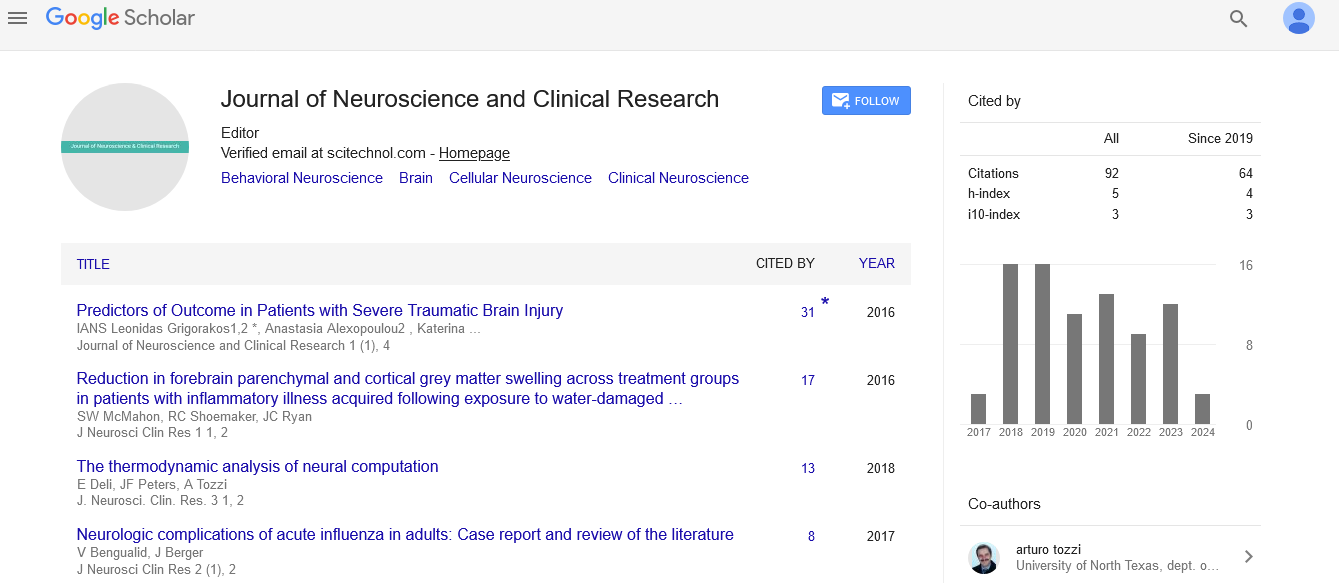Short Communication, J Neurosci Clin Res Vol: 9 Issue: 2
Brain Health Across the Lifespan: Strategies for Cognitive Vitality
Leonerdo Meistri*
1Department of Medicine, University College Hospital, Ibadan, Nigeria
*Corresponding Author: Leonerdo Meistri,
Department of Medicine, University
College Hospital, Ibadan, Nigeria
E-mail: meistril@gmail.com
Received date: 28 May, 2024, Manuscript No. JNSCR-24-137112;
Editor assigned date: 30 May, 2024, PreQC No. JNSCR-24-137112 (PQ);
Reviewed date: 14 June, 2024, QC No. JNSCR-24-137112;
Revised date: 21 June, 2024, Manuscript No. JNSCR-24-137112 (R);
Published date: 28 June, 2024, DOI: 10.4172/Jnscr.1000189
Citation: Meistri L (2024) Brain Health Across the Lifespan: Strategies for Cognitive Vitality. J Neurosci Clin Res 9:2.
Description
Maintaining brain health is essential for overall well-being and quality of life at every stage. Cognitive vitality, the ability to think clearly, learn new information, and remember effectively, is influenced by numerous factors throughout the lifespan. From childhood through old age, adopting specific strategies can promote brain health and mitigate the risks of cognitive decline. This article explores the key aspects of brain health across different life stages and provides actionable strategies to enhance cognitive vitality [1,2]. Proper nutrition is important for brain development in infancy and childhood. Nutrients such as omega-3 fatty acids, iron, and vitamins play vital roles in cognitive function. Breastfeeding, when possible, provides essential nutrients and antibodies that support brain development [3]. Early childhood is a critical period for brain development.
Engaging in activities that stimulate the brain, such as reading, playing musical instruments, and solving puzzles, helps form neural connections. Interactive play and social interactions also promote cognitive and emotional growth. Adolescence is marked by significant brain maturation, particularly in the prefrontal cortex, which governs decision-making and impulse control [4-6]. Encouraging academic challenges, critical thinking, and problem-solving activities helps strengthen cognitive abilities. Adolescents face various stressors, including academic pressures and social dynamics. Mental health support, including counseling and stress management techniques, is essential for preventing anxiety and depression, which can negatively impact cognitive function [7,8].
Regular exercise is one of the most effective strategies for maintaining brain health in adulthood. Physical activity increases blood flow to the brain, promotes the growth of new neurons, and enhances the release of neuroprotective factors. Activities such as aerobic exercise, yoga, and strength training are beneficial [9]. A balanced diet rich in antioxidants, vitamins, and minerals supports brain health. The Mediterranean diet, which emphasizes fruits, vegetables, whole grains, fish, and healthy fats, has been linked to reduced risks of cognitive decline. Limiting processed foods, sugars, and saturated fats is also important. Lifelong learning and mental challenges keep the brain active. Engaging in new hobbies, learning new skills, and participating in intellectually stimulating activities, such as reading, puzzles, and games, can enhance cognitive reserve and delay the onset of cognitive decline. Maintaining strong social connections is associated with better cognitive health. Regular social interactions and community involvement provide emotional support, reduce stress, and stimulate cognitive processes [10].
Structured cognitive training programs, such as memory exercises, brain games, and computerized training, can improve specific cognitive functions in older adults. These programs target areas like memory, attention, and problem-solving skills. Adequate and restful sleep is critical for brain health, particularly in older adults. Sleep disorders, such as insomnia and sleep apnea, can impair cognitive function. Establishing a regular sleep routine, creating a comfortable sleep environment, and seeking medical advice for sleep problems are essential steps. Chronic stress negatively impacts brain health by increasing inflammation and damaging brain cells. Practices like mindfulness meditation, deep breathing exercises, and relaxation techniques can reduce stress levels and promote cognitive well-being. Managing chronic conditions, such as hypertension, diabetes, and cardiovascular diseases, is crucial for brain health. Regular medical check-ups, adherence to prescribed treatments, and lifestyle modifications can prevent or mitigate the impact of these conditions on cognitive function.
Conclusion
Brain health is a lifelong endeavor, requiring attention and care at every stage of life. By adopting strategies that promote cognitive vitality, individuals can enhance their brain function, prevent cognitive decline, and enjoy a higher quality of life. From nurturing the developing brain in childhood to preserving cognitive abilities in older adulthood, the journey towards optimal brain health is ongoing and multifaceted. With a combination of proper nutrition, physical activity, mental stimulation, social engagement, and stress management, it is possible to support and maintain a healthy brain throughout the lifespan.
References
- Prince M, Patel V, Saxena S, Maj M, Maselko J, et al. (2007) No health without mental health. lancet. 370(9590):859-877.
- Cotman CW, Berchtold NC (2002) Exercise: a behavioral intervention to enhance brain health and plasticity. Trends Neurosci. 25(6):295-301.
- Cotman CW, Berchtold NC, Christie LA (2007) Exercise builds brain health: key roles of growth factor cascades and inflammation. Trends Neurosci. 30(9):464-472.
- Evans GW (2003) The built environment and mental health. J Urban Health. 80:536-555.
- Schore AN (2001) Effects of a secure attachment relationship on right brain development, affect regulation, and infant mental health. Infant Ment Health J. 22(1‐2):7-66.
- Schore AN (2001) The effects of early relational trauma on right brain development, affect regulation, and infant mental health. Infant Ment Health J. 22(1‐2):201-69.
- Keyes CL (2005) Mental illness and/or mental health? Investigating axioms of the complete state model of health. J Consult Clin Psychol. 73(3):539.
- Saxena S, Thornicroft G, Knapp M, Whiteford H (2007) Resources for mental health: scarcity, inequity, and inefficiency. lancet. 370(9590):878-889.
- Kieling C, Baker-Henningham H, Belfer M, Conti G, Ertem I, et al. (2011) Child and adolescent mental health worldwide: evidence for action. lancet. 378(9801):1515-1525.
- Wang PS, Aguilar-Gaxiola S, Alonso J, Angermeyer MC, Borges G, et al. (2007) Use of mental health services for anxiety, mood, and substance disorders in 17 countries in the WHO world mental health surveys. Lancet. 370(9590):841-850.
 Spanish
Spanish  Chinese
Chinese  Russian
Russian  German
German  French
French  Japanese
Japanese  Portuguese
Portuguese  Hindi
Hindi 